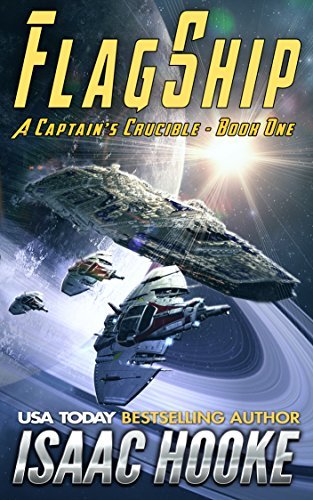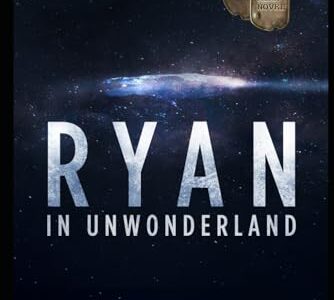Pros
- Space battle with a mysterious force bearing unknown technology
- More realistic space battles and strategies
- Telepaths
Cons
- Jonathan’s motivation at beginning seems disconnected from story
- Plot doesn’t seem to progress as quickly with book focused on one battle
Flagship Review
Flagship by Isaac Hooke throws readers right into the middle of a dangerous summit attempt on what is reported as the galaxy’s tallest mountain. The metaphor for this seemingly impossible climb, as well as the event that takes place near the summit, is explored throughout the rest of the novel through the protagonist Captain Jonathan Dallas.
The introduction of Jonathan Dallas at the very beginning of the story tells readers what kind of person he is–his empathy and willingness to sacrifice his goal for a moral cause is contrasted with his climbing partner’s unwillingness to deter from his goal. That his climbing partner is later rewarded with an admiralty while Jonathan retains a captaincy is all readers need to know to understand what militaries value.
Jonathan’s crucible doesn’t start and end with that mountainous climb and his pivotal decision to continue or save a fellow climber. In fact, that failure not only haunts him, but it becomes a trial that lasts years, perhaps decades, into the future and doesn’t quite resolve itself until the present day where readers find Jonathan once again forced to make a difficult decision that may cost lives.
What the story does well is to create suspense and engagement through the mystery of the unknown spaceships. While the question of their origins are unknown, Jonathan’s opinion and his initial engagement with them make it fairly clear that they are facing an unknown force.
Who these forces are and what their motivations are remain a mystery throughout the novel, with some hypotheses about their presence making for some interesting background information. The revelation of the Elders, their technologies, and the relationship between these forces and the Elders create a level of intrigue that drives the story forward, along with the story-long somewhat realistic space engagement that keeps readers in suspense.
One particularly interesting piece of technology that these forces use is a series of enormous lenses in space that focuses lasers like a magnifying glass to deadly effect. What doesn’t make sense, despite their ability to focus a beam at long range, is the fleet’s inaction–even if benign, any captain would move out of the way rather than sit and wait to see the purpose of such lenses.
Other elements of science fiction, like the presence of telepaths, adds another element of intrigue to the story. They don’t quite play a critical role in the story so far, but if their interaction with the strange force is any indication, they’ll soon find themselves at the forefront of any future interaction with this force.
In terms of plot, this first book is one long extension of a space battle in some faraway system. As with any human versus human military science fiction, the villains are some aspect of “other” countries today. This time, it’s the South Koreans who threaten the colonies with their planet killers.
Flagship by Isaac Hooke is an engaging military science fiction story that is sure to hook readers with its more realistic space battles against mysterious foes who wield unknown technologies that threaten humanity. Who these foes are, where they come from, and what their motivations are all contribute to the intriguing mystery that is sure to drive the series.
Read reviews of other engaging military science fiction books below.



